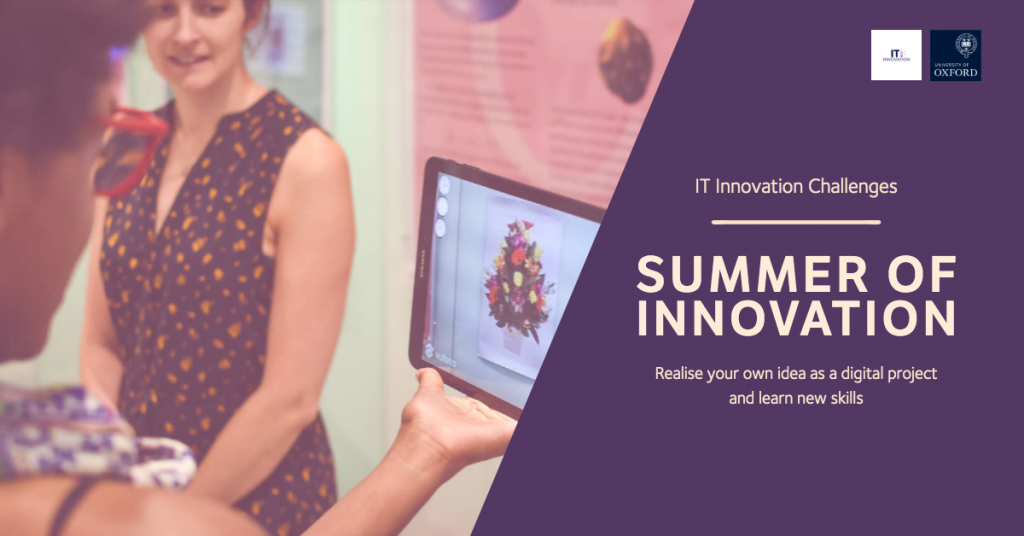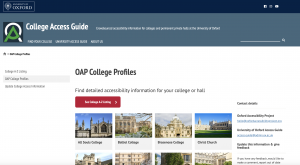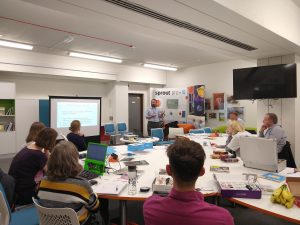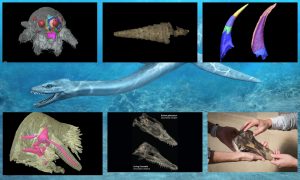The project ‘Instant video creation with Rapidmooc’ led by Dominik Lukeš, Learning Technologist at Saïd Business School, was completed successfully in August 2019. We have spoken to Dominik about the impact of his IT Innovation Challenges project using precisely the facility his project set out to bring to Oxford: the Rapidmooc.
Please summarise your project.
The purpose of this project was to create a space for video creation where faculty, staff and students could create videos for both internal and external purposes without the need for any support in the process of recording and editing. To achieve this, we chose the Rapidmooc platform which is an all-in-one hardware-software unit that requires no prior training and can be used by anyone simply following short instructions. The process can be described in 5 steps:
- Turn on the unit and lights, and put on microphone
- Connect your laptop with a presentation (just as if you were connecting it to a projector)
- Adjust camera angle using on-screen arrows
- Press record button, record and press stop button (on-screen autocue is also available)
- Press on-screen save button to copy recording to a USB memory stick.
The unit comes with all the necessary components to start recording immediately (lights, green screen, microphones) and it can be placed in multi-use rooms because it is on wheels which make it easy to move from room to room. There are many other possible feature including recording from a phone or tablet wireless, picture in picture, running webinars with virtual backgrounds, etc.
In the year since the start of the project, over 300 videos have been made for various purposes with uniformly positive feedback from users. There are now 2 units freely available to use for staff, student and faculty (IT Learning Centre and the Oxford Foundry) and several departments are exploring funding options for acquiring units for internal use.
More details with links to all documentation, sample videos and an online video course on how to use videos available on the Centre for Teaching and Learning website. Regular training sessions are now also being offered by the IT Learning Centre.
What were the outcomes of your project?
The key deliverables of the project are:
During the project over 300 video were made including an outreach video that has since received over 15,000 views on YouTube. In excess of 1500 video files were generated by the system accounting for many trials and tests by users. Samples of produced videos are available on the Video course and were also shared via the Digiknow blog. If all the videos had been produced using external contractors, the total cost would have been over £100,000 which is almost three times the cost of the entire project. But most of them would simply not have been produced at all.
As a result of the project, Dominik Lukeš was invited to speak at two events: Media & Learning conference in Leuven and Devlearn 2019 in Las Vegas. The Use of Video in HE conference also enabled us to bring in contacts and knowledge from across the sector.
Could you summarise the benefits that your project has brought to the University, its staff and students?
They can be summarised under 4 headings:
- Developing new spaces for use to support teaching and learning
- Increasing the production capacity of the university and faculty capabilities
- Developing relationships between departments and divisions through collaboration
- Creation of videos that would otherwise be too costly to produce
What’s next for Rapidmooc?
The project deliverables are now firmly embedded within the University and will continue to serve without any need for further funding. We will continue promotion and training of the facilities and support other departments in their use and in their acquisition of additional or alternative units (some of which are in process of seeking funding).
We will also continue updating the documentation in line with future developments of the platform. The online video course will also receive updates as new runs of the course will give more inspiration.
Based on your experiences of running a project is there anything you can share that can inform the IT Innovation Challenges scheme? Do you any top tips to share with future project managers?
The experience of working within IT Innovation Challenges was entirely positive. We appreciated the flexibility and advice of the programme manager. We did discover that the accounting processes were not familiar to the SBS finance department and this resulted in a few missteps and technical delays with fund approvals. However, everything was easily resolved by communicating directly with the programme manager.
The key advice to future project managers is not to underestimate the need for building personal relationships with all departments who may need to be involved. This may include facilities and maintenance personnel. But even then, these dependencies will be the main source of timeline slippage. However, without relying on less formal channels of communication, achieving objectives will be a challenge.
Another area to take into account is the amount of time it takes to achieve traction with dissemination efforts. Although we achieved the headline dissemination objectives relatively early, it became clear that to make a more lasting and deeper impact on the institution, more time and effort would be needed, and we had to seek an extension. This was despite the fact that all the reactions to the technology were positive and it was an extremely easy sell. It simply took time for people to process the potential and get ready with material to record.








